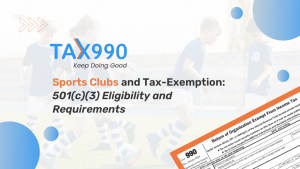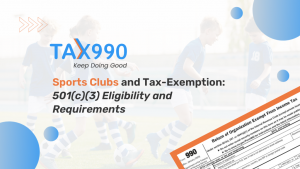
In general, when we think of nonprofits, we automatically think of some of the most obvious and prevalent types, for example, a food bank, an animal rescue shelter, or a public health clinic. However, the nonprofit sector is even more far-reaching.
There are some organizations that do not automatically come to mind but are actually also eligible for federal tax exemption under IRS Section 501(C)(3).
One of these types of organizations is a sports club. In this blog, we will take a closer look at what a sports club is, and give insight into why they are eligible for tax exemption and what their filing requirements are once this has been obtained.
What is a Sports Club?
A sports club is defined as any organization that is formed by a group of members for the sole purpose of supporting sporting activities. This is not limited to a single sport, it can support multiple sports for individuals of all ages.
However, these clubs are usually formed on the basis of the sport they support, the age category (ex. Youth, or adult), and the local where operations are centered (ex, city division, state division, etc).
Why are Sports Clubs Eligible for Federal Tax Exemption?
Sports clubs are eligible for tax-exempt status as long as they meet the basic requirements laid out in Section 501(c)(3) of the IRS code. To be eligible for tax-exempt status, the organization must meet the following:
- The organization is organized and operated exclusively for charitable or educational purposes.
- No private individual or group of shareholders benefits should profit from operations.
- The organization is limited in any lobbying activities and is not affiliated with any political campaigns or with the motivation to influence legislation.
Now, let’s take a closer look at the first requirement above, this will really determine if the organization. The organization must have a purpose that qualifies as charitable, educational, or with the goal of fostering national or international interest in the sport.
Here are a few examples of each:
Charitable Purpose:
- A sports club that is designed to promote a particular sport among the youth in a community. The club is responsible for arranging teams and local/state competitions that foster interest and engagement with this sport.
Educational Purpose:
- A sports club that was formed with the goal of preventing juvenile delinquency in a community. Programming includes sports clinics conducted by qualified instructors free of cost and with all of the required equipment provided to ensure all interested youth can participate.
Other Purpose:
- The sports club exists with the sole purpose of promoting the sport on a national or international level with the goal of fostering appreciation for this sport.
How Does a Sports Club Apply for Tax-exempt Status?
Much like all other nonprofit organizations that exist for a sole charitable or educational purpose, sports clubs can apply for tax-exempt status under Section 501(c)(3). This is done by completing one of the following forms.
- Form 1023: Application for Recognition of Exemption Under Section 501(c)(3) of the Internal Revenue Code
- This form must be completed and filed electronically with the IRS for an organization to be considered for and granted tax-exempt status.
- Form 1023-EZ: Streamlined Application for Recognition of Exemption Under Section 501(c)(3) of the Internal Revenue Code
-
- Organizations that project gross receipts of $5,000 or less, can apply for tax-exempt status using this simplified version of the form. Before choosing to use the 1023-EZ, organizations should complete the Eligibility Worksheet from the IRS, here.
Once the IRS has processed the application, the next step will be to issue your organization an IRS determination letter. This document is proof of tax-exempt status and includes other important information such as the organization’s EIN and tax period.
What are the IRS Filing Requirements for Sports Clubs?
Sports clubs, like all 501(c)(3) nonprofit organizations, are required to file an annual tax return with the IRS based on the size and structure of the organization. This is the purpose of the IRS 990 Series of forms. The organization’s structure (public charity vs. private foundation) and its annual gross receipts will determine which of the following should be filed.
- Form 990-N: This is the shortest form available for nonprofit organizations to file. Also referred to as the 990 e-postcard, this form is designed specifically for organizations with gross annual receipts of $50,000 or less.
- Form 990-EZ: This 990 return is also a shorter, simplified version of the 990. The 990-EZ should be filed by organizations with gross receipts of less than $200,000 and assets totaling less than $500,000 for the tax year.
- Form 990: This is the standard 990 return, also referred to as the “long form”. The 990 should be filed by organizations with gross receipts greater than $200,000 and assets totaling over $500,000 for the tax year.
- Form 990-PF: This is the version of 990 that private foundations must file. A sports club wouldn’t typically be classified as a private foundation however, it is likely that they may receive grants or funding from a private foundation.
- Form 990-T: This is an additional 990 filing requirement that may apply to some organizations if they have generated $1,000 or more in unrelated business income. Called UBI for short, this income is generated through activities that aren’t directly related to the organization’s charitable purpose. For example, if a sports club sells concessions at a sporting event to the crowd that attends, or sells merchandise this would likely classify as UBI.
What’s Next: Simplified 990 E-filing with Tax990!
Now that we’ve done a deep dive into sports clubs – both their nonprofit eligibility and their IRS filing requirements, let’s move on to the filing process itself. Starting in the 2021 tax year, the IRS mandated e-filing for all nonprofit tax returns. That’s right- no matter the size of the organization or which 990 form it’s required to file, they must file their return electronically.
Tax990 provides a complete, affordable, and efficient solution for nonprofit tax filing with the IRS. You can take advantage of time-saving features that promote the accuracy of your 990 returns. The IRS Business Rules are built-in to the e-filing process to prevent common mistakes, and you can choose to complete the form directly or by using our interview-style process. Multi-user Access allows you to loop in your team to collaborate on files from a single account.
After completing the 990 return for your organization, our reviewers and Approvers feature allows you to securely share the return with your key officials and board members as needed for final approval before transmission to the IRS.
Our solution doesn’t end once you click ‘Pay and Transmit’! Our team continues to provide instant IRS updates on the status of your return(s). If the IRS rejects the return by chance, you are able to correct and retransmit it free of charge. We also support filing 990 amendments.
Ready to begin the 990 reporting process with Tax990?!

